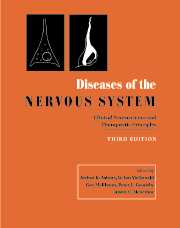Book contents
- Frontmatter
- Dedication
- Contents
- List of contributors
- Editor's preface
- PART I INTRODUCTION AND GENERAL PRINCIPLES
- PART II DISORDERS OF HIGHER FUNCTION
- 13 Congenital disorders of cerebral cortical development
- 14 The aging brain: morphology, imaging and function
- 15 Neurodegenerative diseases
- 16 Aging and dementia: principles, evaluation and diagnosis
- 17 Alzheimer's Disease
- 18 Dementia with Lewy bodies
- 19 Frontotemporal dementia
- 20 Consciousness and its disorders
- 21 Mechanisms of memory and amnestic syndromes
- 22 Acquired disorders of language
- 23 Neglect
- 24 Brain death
- 25 Disorders of mood
- 26 Schizophrenia
- 27 Obsessive–compulsive disorder
- 28 Autism and autistic spectrum disorders
- 29 Attention deficit hyperactivity disorder: spectrum and mechanisms
- 30 The neurobiology of drug addition
- PART III DISORDERS OF MOTOR CONTROL
- PART IV DISORDERS OF THE SPECIAL SENSES
- PART V DISORDERS OF SPINE AND SPINAL CORD
- PART VI DISORDERS OF BODY FUNCTION
- PART VII HEADACHE AND PAIN
- PART VIII NEUROMUSCULAR DISORDERS
- PART IX EPILEPSY
- PART X CEREBROVASCULAR DISORDERS
- PART XI NEOPLASTIC DISORDERS
- PART XII AUTOIMMUNE DISORDERS
- PART XIII DISORDERS OF MYELIN
- PART XIV INFECTIONS
- PART XV TRAUMA AND TOXIC DISORDERS
- PART XVI DEGENERATIVE DISORDERS
- PART XVII NEUROLOGICAL MANIFESTATIONS OF SYSTEMIC CONDITIONS
- Complete two-volume index
- Plate Section
25 - Disorders of mood
from PART II - DISORDERS OF HIGHER FUNCTION
Published online by Cambridge University Press: 05 August 2016
- Frontmatter
- Dedication
- Contents
- List of contributors
- Editor's preface
- PART I INTRODUCTION AND GENERAL PRINCIPLES
- PART II DISORDERS OF HIGHER FUNCTION
- 13 Congenital disorders of cerebral cortical development
- 14 The aging brain: morphology, imaging and function
- 15 Neurodegenerative diseases
- 16 Aging and dementia: principles, evaluation and diagnosis
- 17 Alzheimer's Disease
- 18 Dementia with Lewy bodies
- 19 Frontotemporal dementia
- 20 Consciousness and its disorders
- 21 Mechanisms of memory and amnestic syndromes
- 22 Acquired disorders of language
- 23 Neglect
- 24 Brain death
- 25 Disorders of mood
- 26 Schizophrenia
- 27 Obsessive–compulsive disorder
- 28 Autism and autistic spectrum disorders
- 29 Attention deficit hyperactivity disorder: spectrum and mechanisms
- 30 The neurobiology of drug addition
- PART III DISORDERS OF MOTOR CONTROL
- PART IV DISORDERS OF THE SPECIAL SENSES
- PART V DISORDERS OF SPINE AND SPINAL CORD
- PART VI DISORDERS OF BODY FUNCTION
- PART VII HEADACHE AND PAIN
- PART VIII NEUROMUSCULAR DISORDERS
- PART IX EPILEPSY
- PART X CEREBROVASCULAR DISORDERS
- PART XI NEOPLASTIC DISORDERS
- PART XII AUTOIMMUNE DISORDERS
- PART XIII DISORDERS OF MYELIN
- PART XIV INFECTIONS
- PART XV TRAUMA AND TOXIC DISORDERS
- PART XVI DEGENERATIVE DISORDERS
- PART XVII NEUROLOGICAL MANIFESTATIONS OF SYSTEMIC CONDITIONS
- Complete two-volume index
- Plate Section
Summary
Depression refers in the medical setting to clinically significant but transient emotional states which are called adjustment disorders and also to a clinical syndrome called major depression which occurs in unipolar depressive disorder and bipolar disorders. Confusion of adjustment disorders with depressive syndromes plagues both medical care and reasoning about mechanisms. Once identified, mood disorders (unipolar and bipolar disorders) are treated quite successfully with any of several medications and/or psychotherapy. The pathophysiology of mood disorders remains obscure, but clues are emerging as to the neuroanatomic components, molecular systems and genes involved in the vulnerability to mood disorder. The cumulative effect of these developments on a number of scientific fronts will be to unravel the complex knot of etiologic factors, leading to the refinement of current empirical treatment and the development of rational treatment. When we can identify the mechanisms of mood disorder, we will also gain an improved perspective from which to understand the role of environmental factors in the development of depressive and manic disorders.
In the official diagnostic nomenclature of American psychiatry a transition from the term ‘affective disorders’ to ‘mood disorders’ was made in 1987, though the diagnostic criteria for major depression and mania did not change appreciably. We use the term mood to denote a persistent emotional state, and affect or affective to refer to a constellation of phenomena generally associated with and including mood. We will use the term depression, hereafter, only to denote the syndrome of depressive illness.
Epidemiology
Mood disorders are among the most common illnesses in the community and in the medical clinic. Depression, in avariety of community samples worldwide, affects as many as one in six individuals in the course of a lifetime (Doris et al., 1999). Mania occurs in 1–2% of the population. Ten to twenty per cent of patients screened in a primary care clinic have a major depressive disorder (Zung et al., 1993); depression was found in over one-quarter of patients in a neurology practice (Carson et al., 2000). Mania is less often a presenting problem for non-psychiatric physicians, but can occur as an iatrogenic complication from the use of antidepressants (Benazzi, 1997), corticosteroids (Sharfstein et al., 1982), or psychostimulants (Masand et al., 1995). Moreover, a number of medical conditions are associated with the syndromes of mania and depression, as will be described below.
- Type
- Chapter
- Information
- Diseases of the Nervous SystemClinical Neuroscience and Therapeutic Principles, pp. 364 - 373Publisher: Cambridge University PressPrint publication year: 2002



